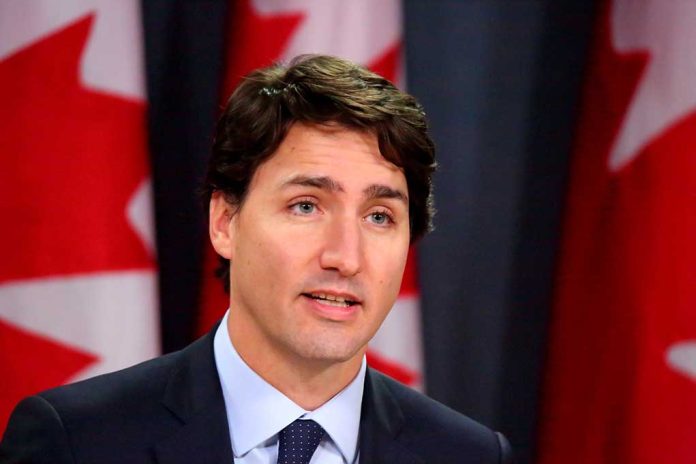
Canadian Prime Minister Justin Trudeau announces resignation, shaking up the political landscape and raising questions about the future of the Liberal Party.
At a Glance
- Trudeau to resign as Liberal Party leader and Canada’s Prime Minister
- Resignation follows internal party pressure and declining popularity
- Parliament prorogued until March 24, new leader selection process underway
- Conservative Party leading in polls, possibility of early federal election
- Trudeau’s departure marks end of era in Canadian politics since 2015
Trudeau’s Sudden Departure
In a surprising turn of events, Canadian Prime Minister Justin Trudeau has announced his resignation as leader of the Liberal Party and as Canada’s Prime Minister. This decision comes after weeks of mounting pressure and marks the end of Trudeau’s tenure since 2015.
The announcement has sent shockwaves through Canadian politics, with implications for both domestic and international relations. Trudeau’s resignation follows a period of declining popularity and internal party pressure, with the Liberal Party trailing behind the Conservative Party in recent polls.
🚨 #BREAKING – JUSTIN TRUDEAU: "I intend to resign as [Liberal] Party leader, as Prime Minister [of Canada] after the party selects its next leader."
Replacement elections to happen in the near future.
"If I'm having to fight internal battles, I cannot be the best option." pic.twitter.com/HPAh6FJHlT
— Eric Daugherty (@EricLDaugh) January 6, 2025
Political Landscape in Flux
Trudeau’s departure raises significant questions about the Liberal Party’s future leadership and the management of an impending federal election. The Prime Minister has requested the governor general to prorogue Parliament, suspending proceedings until March 24. This move buys time for the Liberal caucus to select a new leader, though the exact process remains unclear.
Typically, Canadian federal party leaders are chosen through a months-long leadership convention. Trudeau himself mentioned a “robust, nationwide, competitive process” for selecting the new leader, indicating a potentially lengthy transition period. This uncertainty in leadership comes at a critical time for the Liberal Party, which currently holds 153 out of 338 seats in the House of Commons, 17 seats short of a majority.
Electoral Implications and Opposition Strategies
The resignation introduces the possibility of a no-confidence vote by the opposition, potentially leading to an early federal election. Current polls suggest the Conservative Party would win decisively if an election were held today, adding urgency to the Liberal Party’s leadership transition. The Conservatives have been attempting to trigger an election by proposing no-confidence votes, a strategy that may gain traction in the wake of Trudeau’s resignation.
The Liberal Party’s support has dropped to an all-time low of 16% according to a recent Angus Reid survey, highlighting the challenges facing the party as it navigates this leadership change. The next few months will be crucial as the Liberals attempt to regain public trust and present a unified front in the face of growing conservative opposition.
International Considerations
Trudeau’s resignation also has international implications, particularly in light of recent controversies. His recent visit to former U.S. President Trump at Mar-a-Lago and subsequent social media interactions have been subject to criticism. Additionally, Trump’s proposed tariffs on Canadian and Mexican goods have added to the political tension, highlighting the complex relationship between Canada and its southern neighbor.
As Canada prepares for a new chapter in its political history, the impact of Trudeau’s resignation will be felt both domestically and internationally. The coming months will be crucial in shaping the future direction of Canadian politics and its role on the global stage.









